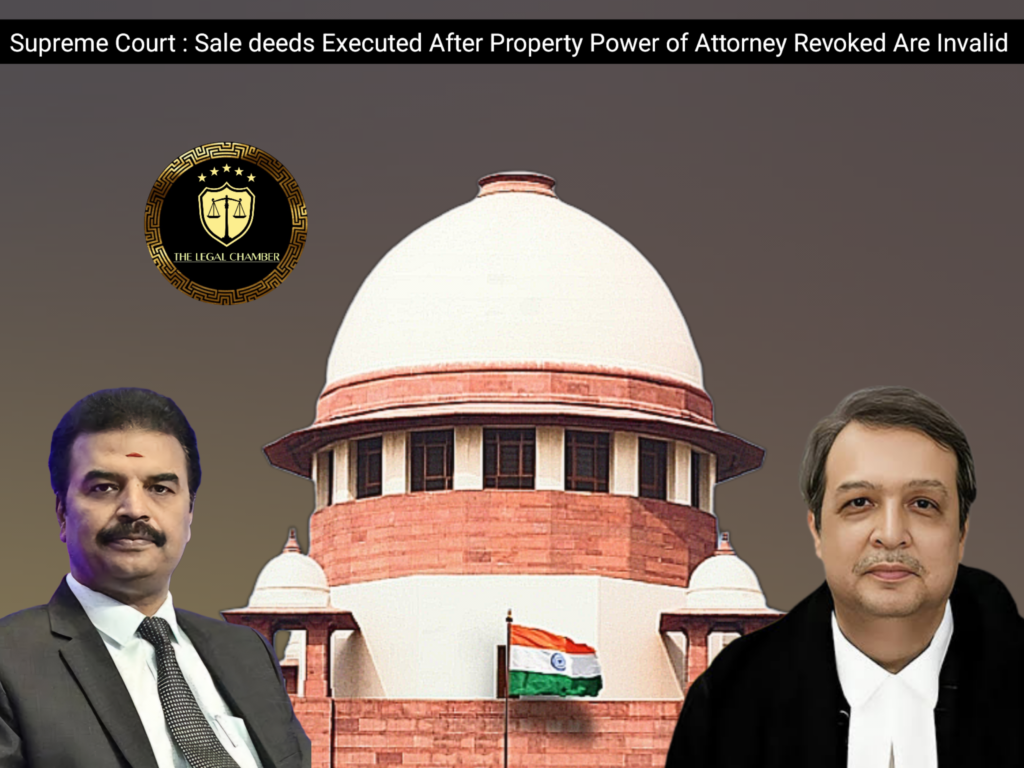
The Supreme Court clarified that an unregistered agreement to sell or power of attorney does not confer title or interest in immovable property. The Court emphasized that property transfer requires a registered deed of conveyance. It also ruled that a plaint cannot be rejected entirely under Order VII Rule 11 CPC if even one distinct cause of action is triable.
Facts Of The Case:
Vinod Infra Developers Ltd. (appellant) claimed ownership of agricultural land and obtained a loan of Rs. 7.5 crores from Mahaveer Lunia (Respondent No. 1) in May 2014. The appellant’s Board of Directors authorized their Managing Director and Respondent No. 1 to sell the property. Subsequently, an unregistered power of attorney and agreement to sell were executed in favor of Respondent No. 1 on May 24, 2014.In August 2015, the original sale deeds for the property were impounded for insufficient stamp duty, and the appellant handed over these documents to the private respondents as security for the loan. In April 2022, the respondents failed to respond when the appellant sought to settle the loan and retrieve documents. Consequently, on May 24, 2022, the appellant’s Board of Directors revoked the authority granted to Respondent No. 1, followed by the revocation of the power of attorney on May 27, 2022.Despite this, Respondent No. 1 executed sale deeds on July 13 and 14, 2022, which were registered on July 19, 2022, in his and Respondent Nos. 2-4’s favor. The appellant then filed a civil suit seeking declaration, possession, and permanent injunction, arguing the transaction was a mortgage and the sale deeds were non-est. Respondent Nos. 1-4 sought rejection of the plaint, which was initially dismissed by the trial court but allowed by the High Court. This appeal was filed challenging the High Court’s order
Procedural History:
The appellant, Vinod Infra Developers Ltd., instituted Original Civil Suit No. 122 of 2022 before the District Court, Jodhpur, against Respondent Nos. 1 to 4 and concerned government authorities, seeking reliefs of declaration, possession, and permanent injunction regarding the subject property. During the pendency of this suit, Respondent Nos. 1 to 4 filed an application under Order VII Rule 11 CPC, seeking rejection of the plaint. The Additional District Judge No. 7, Jodhpur Metropolitan, dismissed this application by an order dated July 14, 2023. Challenging this dismissal, Respondent Nos. 1 to 4 filed S.B. Civil Revision Petition No. 99 of 2023 before the High Court of Judicature for Rajasthan at Jodhpur. The High Court allowed the Civil Revision Petition by its order dated January 31, 2025, thereby setting aside the Additional District Judge’s order and rejecting the plaint under Order VII Rule 11 of the Code of Civil Procedure, 1908. Aggrieved by the High Court’s decision, the appellant / plaintiff preferred the present Civil Appeal before the Supreme Court of India. The Supreme Court, upon hearing the appeal, granted leave.
READ ALSO : Big Win for Disabled Workers: Supreme Court Strikes Down Discriminatory GO on Seniority and Promotion
Court Observation:
The Supreme Court observed that a plaint’s rejection under Order VII Rule 11 CPC is only permissible if it clearly lacks a cause of action, is barred by law, is undervalued, or insufficiently stamped, strictly based on the plaint’s averments. Triable issues arising from pleadings preclude summary rejection. Unregistered documents like the power of attorney and agreement to sell do not confer valid title or authority to transfer property. Sections 17 and 49 of the Registration Act, 1908, deem such documents inadmissible for conveying title, except for collateral purposes or specific performance suits. Section 54 of the Transfer of Property Act, 1882, further clarifies that a sale contract alone does not create interest in immovable property. The Court found the High Court erred by rejecting the entire plaint and deeming a distinct cause of action—concerning sale deeds executed after the power of attorney’s revocation—as merely “academic,” contrary to the principle that a plaint survives if even one relief is maintainable. Factual disputes require trial, not threshold rejection. Ownership and title issues fall under civil court jurisdiction, not revenue authorities
Final Decision & Judgement:
The Supreme Court allowed the appeal, setting aside the impugned order of the High Court and restoring the order of the Additional District Judge. Consequently, the plaint is directed to be taken back on the file of the trial Court, which shall proceed with the suit in accordance with law, uninfluenced by any observations made in the Supreme Court’s judgment. The parties are directed to bear their own costs. Any connected miscellaneous application(s) will stand closed.
Case Details:
Case Title: VINOD INFRA DEVELOPERS LTD. VERSUS MAHAVEER LUNIA & ORS. Citation: 2025 INSC 772 Civil Appeal No.: 7109 OF 2025 Date of Judgment: May 23, 2025 Judges/Justice Name: J.B. Pardiwala, & R. Mahadevan
Download The Judgement Here